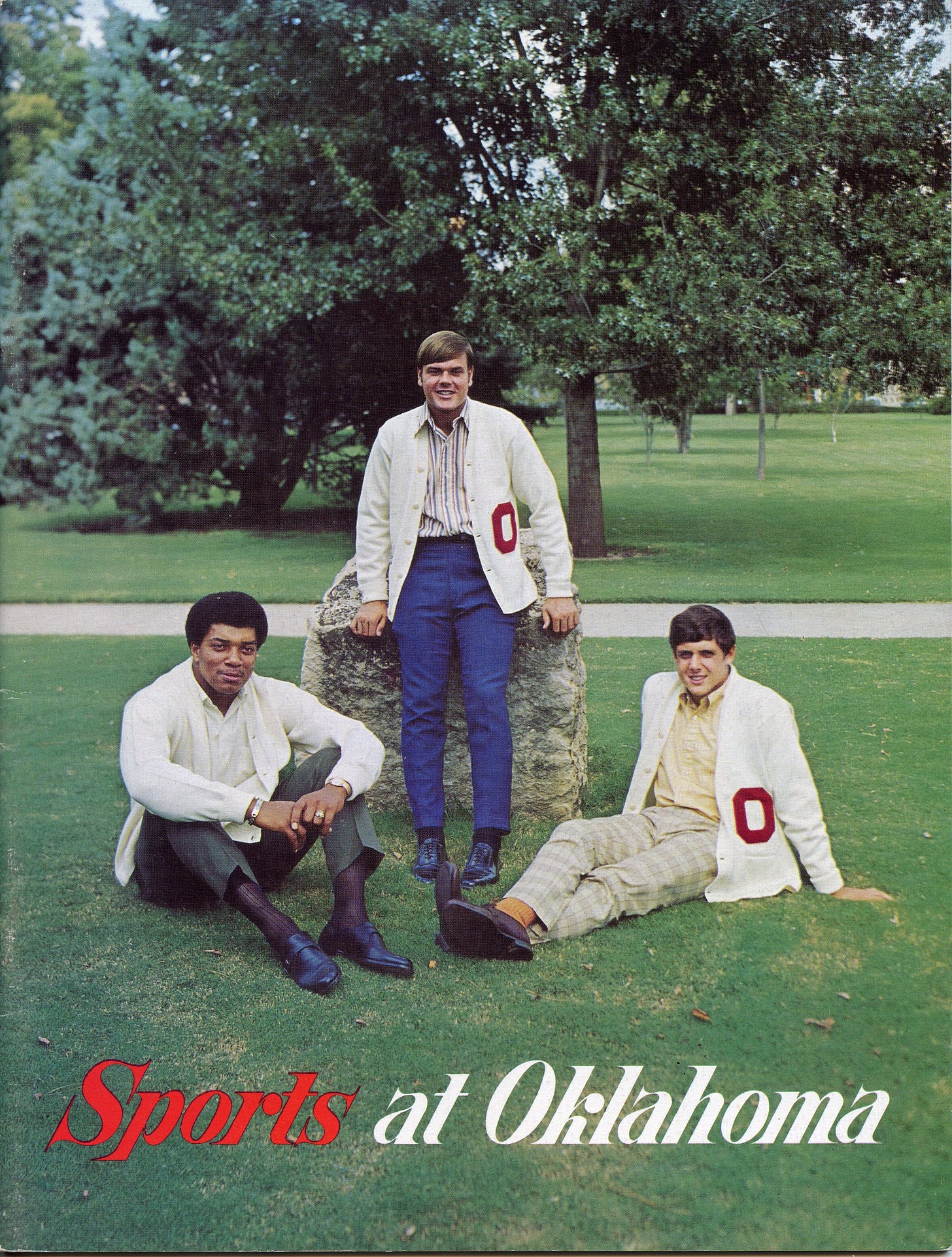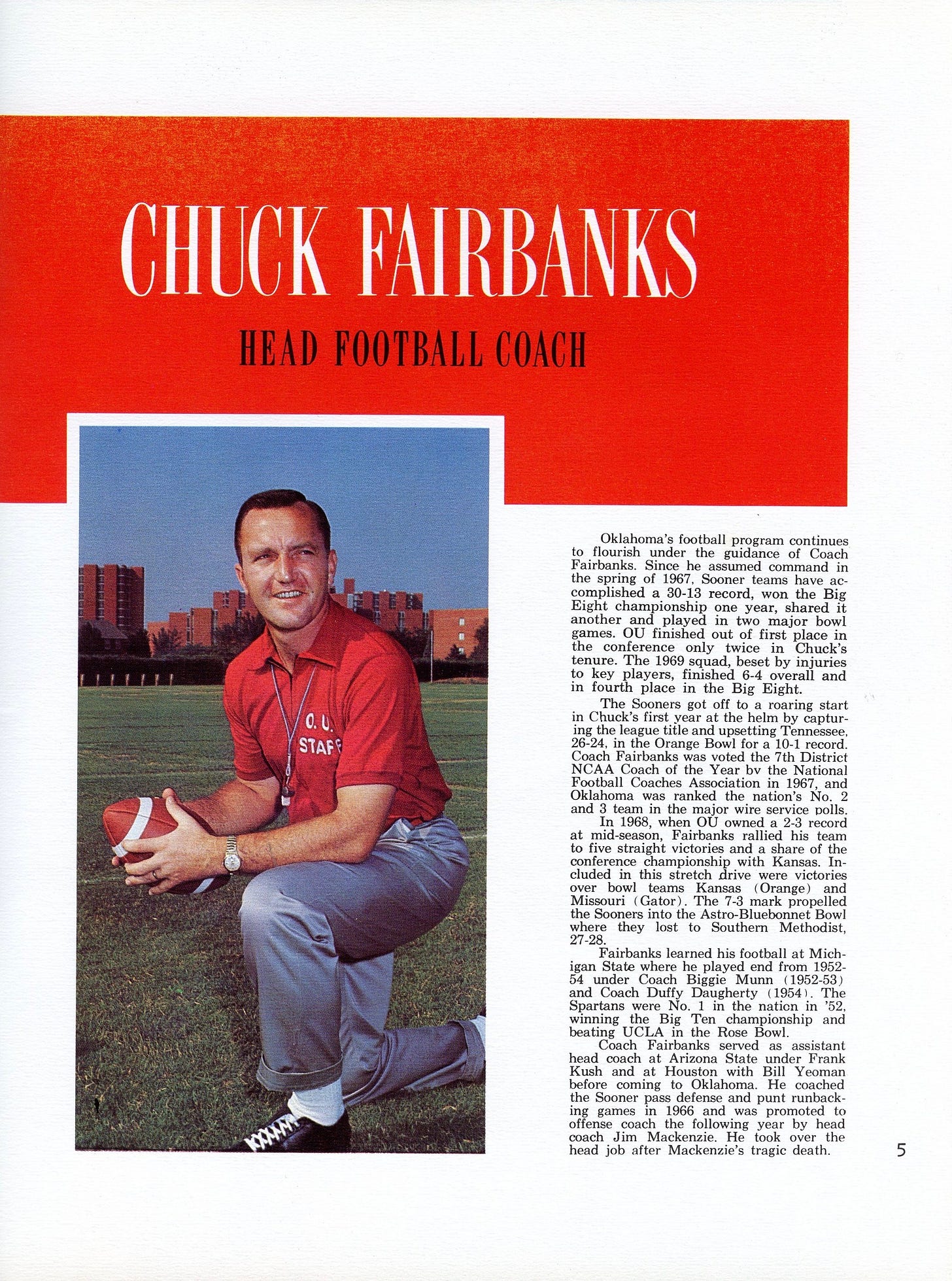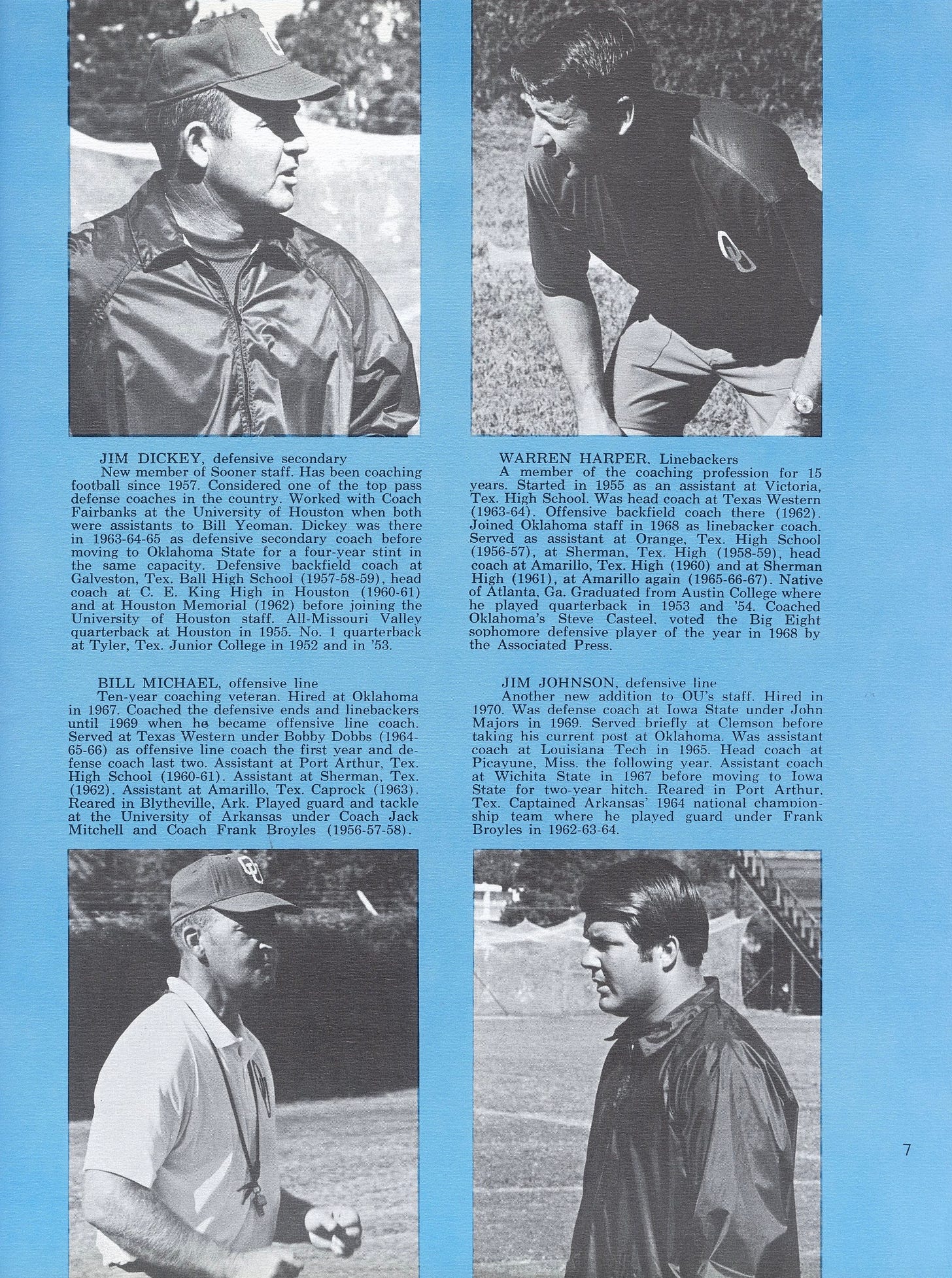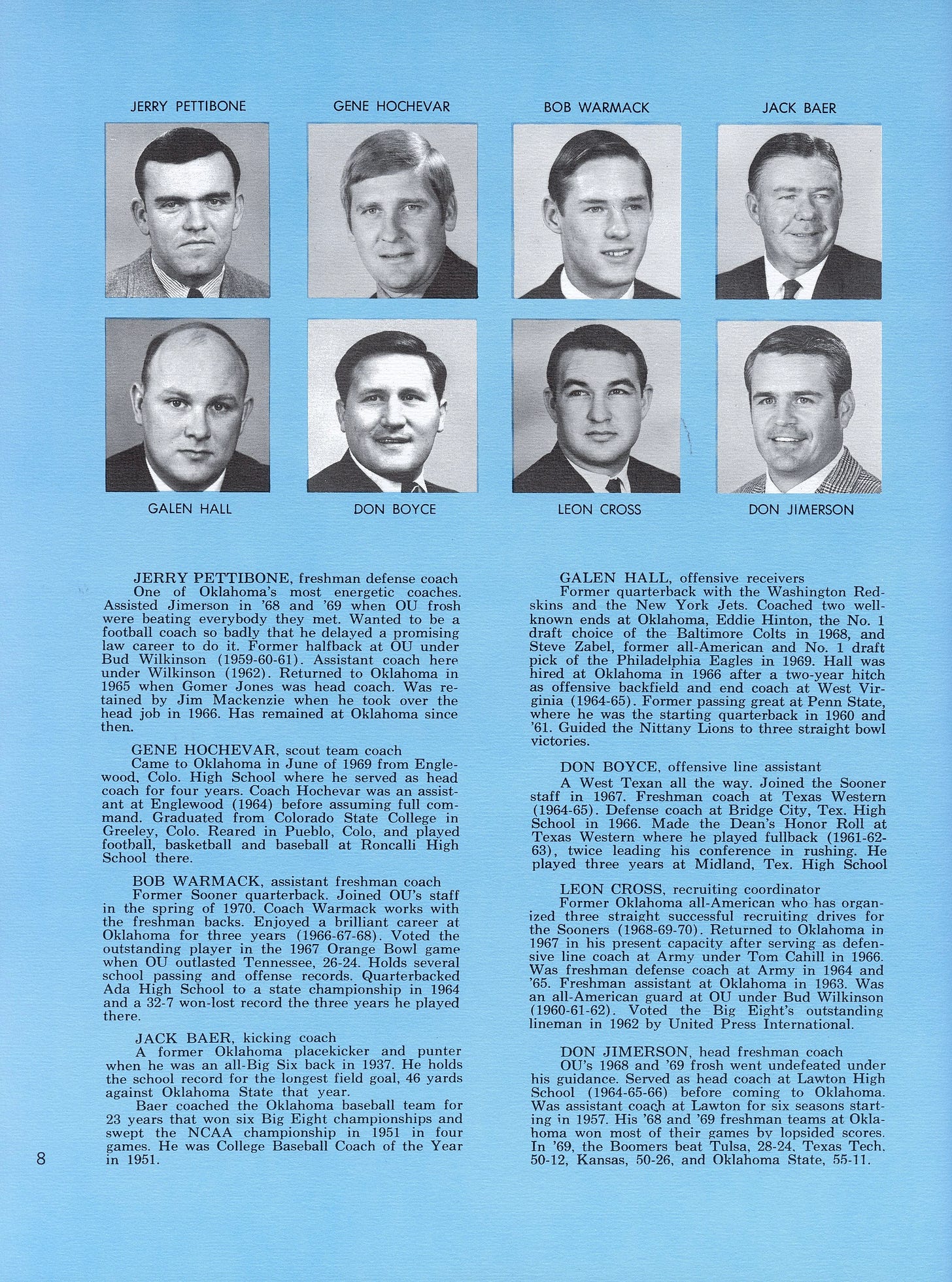Today's Tidbit: 1970 Oklahoma Coaching Staff and Values
Looking toward the 1970 season, the Oklahoma Sooners were coming off a disappointing and injury-plagued 6-4 year in Chuck Fairbanks' third season at the helm, though Steve Owens winning the Heisman Trophy brightened their perspective. The poor record reinforced the Sooners’ need to recruit successfully and to assist, they developed a brochure, Sports At Oklahoma, that informed prospects of the virtues of attending and playing for the University of Oklahoma.
The forty-page booklet focuses on football while devoting a few pages to other sports in Norman. The contents include Oklahoma's values (don't laugh), facilities, coaching staff, and program credentials or brag sheets (e.g., titles, All-Americans). With too much content to cover in one Tidbit, we will focus on the coaching staff and values pages today and cover other topics in the future.
The Sooners had a strong staff, as might be expected at a football blue blood, but it proved even better than expected. Let's review the members of the 1970 staff and see what became of them, several of which were involved in scandals beyond those occurring at Oklahoma.
Chuck Fairbanks was an assistant at Oklahoma in 1967 when the head coach, Jim McKenzie, died of a heart attack. Fairbanks took over and won three Big Eight championships, leaving for the New England Patriots job after the 1972 season, shortly before a scandal involving altered transcripts led to the Sooners receiving a two-year bowl ban. Fairbanks led the Patriots for six years before taking over at Colorado for three. He ended his coaching career with the New Jersey Generals.
Like many coaches, Larry Lacewell, the defensive coordinator, bounced around early in his career before landing at Oklahoma and coaching under Fairbanks and Switzer. He was the head coach at Arkansas State for three years before spending a long stretch as the director of scouting for the Dallas Cowboys, part of which overlapped with Switzer.
Barry Switzer was the offensive coordinator in 1970 and became head coach at Oklahoma upon Fairbanks' departure. He led the Sooner from 1973 to 1988, winning twelve Big Eight and three national championships. Switzer resigned amid a player payment scandal that led to three years probation and was out of coaching for five years until he took over the Dallas Cowboys job after Jimmy Johnson's departure. In four years in Dallas, Switzer won three division titles and a Super Bowl.
Jim Dickey coached the Sooners' secondary and left after the 1972 season. He spent seven-plus seasons as head coach at Kansas State but never finished higher than fourth in the Big Eight.
Warren Harper, linebackers coach, coached at Texas high schools and UTEP before joining the Sooner staff, where he remained until 1982, after which he became a scout for the Seattle Seahawks.
Bill Michael, offensive line coach, left Oklahoma after the 1972 season before reemerging as the head coach at UTEP for five seasons. He then adopted the life of a coaching nomad filling offensive and defensive roles over the next fifteen years.
Jimmy Johnson handled the Sooners' defensive line and, like others, left following the 1972 season, holding several defensive coordinator jobs before taking over at Oklahoma State. (Johnson, Switzer, and Dickey were Big Eight head coaches simultaneously.) After moderate success there, he took the Miami job, where his first season included a loss to Boston College on Doug Flutie's Hail Mary pass. His Bad Boys won a national championship before he left for the Dallas Cowboys job, where he won consecutive Super Bowls. He also coached the Miami Dolphins for four years.
Jerry Pettibone, the freshman defensive coordinator, stayed at Oklahoma through the 1978 season and later became head coach at Northern Illinois and Oregon State.
Gene Hochevar handled the scout team and remained at Oklahoma through 1978 before heading to Colorado for another assistant coaching job.
Bob Warmack, assistant freshman coach, was a three-year starting QB for the Sooners. He later coached at Missouri, Wyoming, and Texas, including Earl Campbell's Heisman season.
Jack Baer, the kicking coach, was the Sooner baseball coach for 25 years, but as a former kicker, he enjoyed a fun side hustle.
Galen Hall handled the wide receivers and was Oklahoma’s offensive coordinator from 1973 to 1982. He took the offensive coordinator job at Florida in 1983 and became interim head coach amidst a scandal. The Gators won out after he took over, and Hall was named the head coach. After five years, Hall was forced out due to another scandal, elements of which he denies or were later overruled. He then held roles in the WFL, arena football, and NFL Europe, before settling into an assistant position at Penn State under Joe Paterno.
Don Boyce, assistant offensive line coach, became the offensive line coach at Oklahoma State, Arkansas, and Pitt.
Leon Cross, the recruiting coordinator, played at Oklahoma under Bud Wilkinson. He assisted Wilkinson, McKenzie, and Fairbanks before taking on athletic administration roles at Oklahoma.
Don Jimerson became the head freshman coach in 1967, remaining in that or other assistant roles until 1976 when he switched to athletic administration at Oklahoma.
So, there you have it, a profile of a football staff that enjoyed tremendous success on the field, often marred by off-the-field scandals. I mentioned early in the story that the brochure included a statement of values. Feel free to review it and determine whether some of these coaches were true to those values.
Football Archaeology is reader-supported. Click here to buy one of my books or otherwise support the site.







